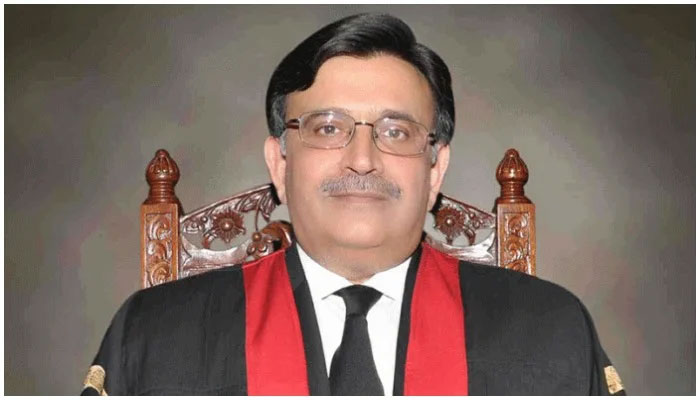‘Corruption must be checked for rule of law’
CJP Justice Umar Ata Bandial remarked that dishonesty must be checked for the rule of law and supremacy of the Constitution
ISLAMABAD: Chief Justice of Pakistan (CJP) Umar Ata Bandial Thursday remarked that dishonesty must be checked for the rule of law and supremacy of the Constitution, adding that corruption also affects the economy.
A three-member bench of the apex court, headed by Chief Justice of Pakistan (CJP) Umar Ata Bandial and comprising Justice Ijazul Ahsen and Justice Syed Mansoor Ali Shah, heard the petition of Chairman of the Pakistan Tehreek-i-Insaf Imran Khan, challenging the amendments made by the coalition government to the National Accountability Ordinance (NAO) 1999.
During the hearing, Khawaja Haris, counsel for the PTI chairman, continued his arguments and submitted that the amendments under challenge are against the Constitution and the contract between the public and their chosen representatives. He submitted that under the amendments, the public office-holders, as trustees of the public, will evade the accountability process that would also ultimately affect the fundamental rights of citizens as well. “You are right that corruption is a disease and the accountability of people involved in corruption is necessary for maintaining the rule of law and supremacy of the Constitution as it also affects the economy of the country,” the CJP told the learned counsel for the PTI chairman. “But the question before the court is where it could draw a line where fundamental rights have been affected,” the CJP said, adding that the NAB laws are not flawed, but their application is incorrect. The chief justice then asked the learned counsel what the standard would be if the court decided that corruption should be strictly prosecuted. Justice Syed Mansoor Ali Shah said the court gives daily decisions about violations of fundamental rights. “Tomorrow, if a citizen comes to court saying there is no law against corruption and we ask the parliament to legislate a law, but when that citizen comes back and says the law against corruption is not so rigid and people are acquitted, direct the parliament to make a rigid law,” Justice Mansoor Ali Shah said. “If this is to be done by the court, let us run the parliament,” Justice Mansoor Ali Shah remarked and asked the counsel if their job is to ask the parliament to make rigid legislation.
Justice Mansoor Ali Shah said that climate change is the biggest threat to Pakistan, therefore, there is a dire need to make legislation for tackling climate change, which is more important than the NAB laws. The judge said that the whole of Pakistan is being destroyed as natural calamities like floods have played havoc with the people of the country. Justice Mansoor Ali Shah again questioned if any citizen comes to court and said that the law about climate change is not rigid, hence the parliament is directed to make the law more rigid. “Khawaja Sahib, let us know whether this is our job to do so; I cannot understand,” Justice Mansoor Ali Shah told the counsel. “If you permit me, I can cite the court’s judgments available for answering this question,” Khawaja Haris replied, to which Justice Mansoor Ali Shah replied that he also awaits that day, adding that even he has questions for the last-day arguments of the learned counsel. Meanwhile, the court adjourned further hearings until Nov 21.
-
 Google Warns Of State-sponsored Cyberattacks Targeting Defense Sector Employees
Google Warns Of State-sponsored Cyberattacks Targeting Defense Sector Employees -
 Ransom Deadline Passes: FBI Confirms ‘communication Blackout’ In Nancy Guthrie Abduction
Ransom Deadline Passes: FBI Confirms ‘communication Blackout’ In Nancy Guthrie Abduction -
 Jeff Bezos Hints At Blue Origin Moon Plans As Elon Musk Responds With Cautious Praise
Jeff Bezos Hints At Blue Origin Moon Plans As Elon Musk Responds With Cautious Praise -
 Zach Bryan Slams Turning Point USA Alternative Halftime Show: 'Embarrassing As Hell'
Zach Bryan Slams Turning Point USA Alternative Halftime Show: 'Embarrassing As Hell' -
 South Korea Blames Coupang Data Breach On 'management Failures,' Not Cyber Attack
South Korea Blames Coupang Data Breach On 'management Failures,' Not Cyber Attack -
 ‘Disgraced’ Andrew More Concerned About ‘issue Of His Legacy’ Than Epstein Links
‘Disgraced’ Andrew More Concerned About ‘issue Of His Legacy’ Than Epstein Links -
 Instagram Plans New Snapchat-style App ‘Instants’ Amid Rising AR Competition
Instagram Plans New Snapchat-style App ‘Instants’ Amid Rising AR Competition -
 Safer Internet Day 2026: Is Social Media Ban The Only Way To Protect Kids?
Safer Internet Day 2026: Is Social Media Ban The Only Way To Protect Kids? -
 Piers Morgan Finally Breaks Silence On Kidnapping Of Savannah Guthrie's Mother Nancy
Piers Morgan Finally Breaks Silence On Kidnapping Of Savannah Guthrie's Mother Nancy -
 Lenore Taylor Resigns As Guardian Australia Editor After Decade-long Tenure
Lenore Taylor Resigns As Guardian Australia Editor After Decade-long Tenure -
 'Mortified' Princess Eugenie, Beatrice Plan Interview To Finally Speak Truth In Sarah Ferguson, Andrew-Epstein Scandal
'Mortified' Princess Eugenie, Beatrice Plan Interview To Finally Speak Truth In Sarah Ferguson, Andrew-Epstein Scandal -
 Lewis Hamilton Spent Years Trying To Catch Kim Kardashian's Attention?
Lewis Hamilton Spent Years Trying To Catch Kim Kardashian's Attention? -
 Royal Strategy Revealed As King Charles, Prince William Issue Statements On Andrew Row
Royal Strategy Revealed As King Charles, Prince William Issue Statements On Andrew Row -
 Inside Will Smith's Struggle To Revive His Career After Infamous Oscar Incident
Inside Will Smith's Struggle To Revive His Career After Infamous Oscar Incident -
 What’s Coming Out Of Meghan Markle’s War Against Prince William? Inside People’s Unease
What’s Coming Out Of Meghan Markle’s War Against Prince William? Inside People’s Unease -
 Australia Seeks Urgent Meeting With Roblox Over 'Disturbing' Content Complaints
Australia Seeks Urgent Meeting With Roblox Over 'Disturbing' Content Complaints




